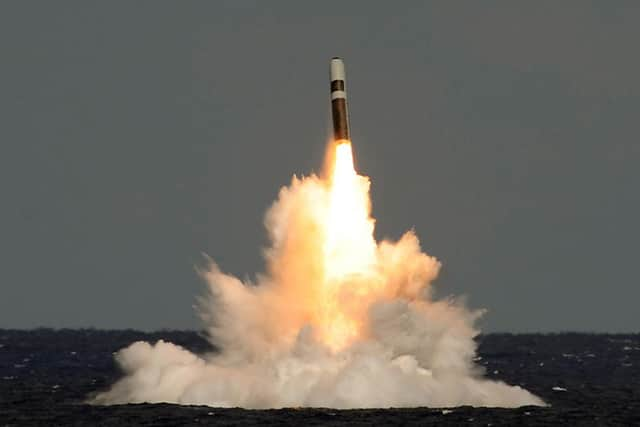Royal Navy: MoD trident missile test failure has "no implications" for nuclear deterrent - defence secretary
and live on Freeview channel 276
Grant Shapps said the “anomaly” occurred during an exercise involving the ballistic missile submarine HMS Vanguard, but confirmed it had “no implications” for the UK’s ability to deploy nuclear weapons. In a written statement to Parliament, Mr Shapps said: “On January 30 2024, HMS Vanguard and her crew conducted their most recent test operation.
"The test reaffirmed the effectiveness of the UK’s nuclear deterrent, in which the Government has absolute confidence. The submarine and crew were successfully certified and will re-join the operational cycle as planned. On this occasion, an anomaly did occur, but it was event specific and there are no implications for the reliability of the wider Trident missile systems and stockpiles. Nor are there any implications for our ability to fire our nuclear weapons, should the circumstances arise in which we need to do so.


Advertisement
Hide AdAdvertisement
Hide Ad"The Trident missile system remains the most reliable weapons system in the world, having successfully completed more than 190 tests. The government has absolute confidence that the UK’s deterrent remains effective, dependable and formidable.” He also reiterated the UK’s commitment to its nuclear deterrent, saying the UK’s “resolve and capability” to deploy nuclear weapons if necessary “remains beyond doubt”. Mr Shapps was on-board the 150-metre vessel at the time of the incident, a spokesman for the defence secretary confirmed, which occurred at the end of a “demonstration and shakedown operation” following extensive maintenance work.
The Ministry of Defence (MoD) has declined to provide further details on national security grounds. The Sun, which first reported the test failure, said the incident occurred during an exercise off the coast of Florida, United States, last month. The newspaper reported that a dummy Trident 2 missile was propelled into the air by compressed gas in its launch tube, but that its so-called first stage boosters did not ignite. An anonymous source quoted by The Sun said: “It left the submarine but it just went plop, right next to them.” It is said to be the second misfiring in a row, with a test launch of a Trident missile by the Royal Navy off the coast of the US in June 2016 also reported to have been a failure.


Following reports of the most recent misfire, shadow defence secretary John Healey said: “Reports of a Trident test failure are concerning. The defence secretary will want to reassure Parliament that this test has no impact on the effectiveness of the UK’s deterrent operations.” First Sea Lord Admiral Sir Ben Key was also present at the time to mark what was the final exercise for Vanguard and its crew after undergoing a refit that took more than seven years, an MoD spokesman said. The incident comes at a time of high global tension, with a war raging in the Middle East and Russia’s invasion of Ukraine approaching its two-year anniversary.
HMS Vanguard is one of four of the so-called Vanguard-class nuclear submarines that first went on patrol in 1994, with one of the vessels continually at sea. They carry the American-built Trident 2 D5 nuclear missiles, the mainstay of Britain’s strategic nuclear deterrent. A Trident missile can be fired at targets up to 4,000 miles away and at its fastest can travel at more than 13,000 miles an hour, according to the Royal Navy. They are 13 metres long, weigh 130,000lb (58,500kg) and are ejected from the submarine by high-pressured gas before they fire as they reach the surface of the water.
Advertisement
Hide AdAdvertisement
Hide AdEach Vanguard-class submarine can hold up to 16 intercontinental ballistic missiles, but will only carry up to eight Trident rockets and up to 40 nuclear warheads. The V-class is due to be replaced by the bigger Dreadnought-class submarines in the 2030s. Between £31bn and £41bn has been set aside for the wider programme of replacing the Vanguard-class submarines, according to figures from the House of Commons Library.
Comment Guidelines
National World encourages reader discussion on our stories. User feedback, insights and back-and-forth exchanges add a rich layer of context to reporting. Please review our Community Guidelines before commenting.